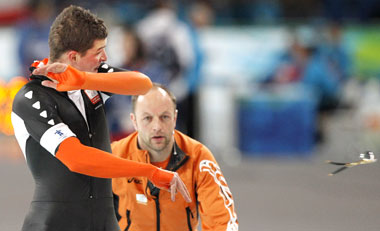Jas ova ne go znaefff:
Coach sends Kramer on embarrassing wrong turn
RICHMOND, British Columbia –
Sven Kramer peeled off his racing glasses and hurled them onto the infield, just as he had thrown away a Winter Olympic gold medal and nearly half a million dollars a couple of minutes earlier.
“What did you do?” he screamed in Dutch as he skated past coach Gerard Kemkers, who stood with his head in his hands, unable to comprehend the biggest moment of sporting stupidity that we will see at these Games.
Olympic history is littered with athletes who have blown a shot at glory through lack of preparation, failure to handle pressure, or plain bad luck. For Dutch speedskater Kramer, his chance to enter the history books crashed around his ears because of a split-second mental meltdown, the most basic of sporting errors.
“It sucks,” Kramer said. “I can’t believe it. I don’t usually want to blame anyone else, but this time I can’t do anything else.”
With eight laps to go in the men’s 10,000 meters, a lung-bursting 25-lap slog that is sometimes tedious but a feat of titanic endurance nonetheless, Kramer had his second gold of the Games all wrapped up. Cruising along the back straight, he had, at least in skating terms, time to stop for a cup of tea and a chat with coach Kemkers before clinching his spot atop the podium.
But then a single point of Kemkers’ finger and a cry of “inside lane” directed the skater to the inner course when he should have switched to the outer, providing one of the most surreal moments of the past nine days.
“It is the worst moment of my career,” said Kemkers, who was the
United States’ speedskating coach and was based in Milwaukee from 1994 to 1998. “My world collapsed.”
Perhaps Kramer and Kempers can find solace by talking to
Lindsey Jacobellis, the American snowboard-cross racer who flung away victory by showboating toward the end of her event four years ago.
Whereas Kramer should and to an extent still will go down as one of the stars of Vancouver, he has forever etched his name onto the list of greatest sporting screw-ups.
“There will be a lot of jokes made about it,” said Team USA’s
Chad Hedrick, who suffered a similar fate in a world championship event in 2006. “To be the fastest guy out there and not leave with the gold medal is pretty tough to swallow.”
It is no laughing matter for Kramer, who completed the course and finished 7.57 seconds ahead of
South Korea’s
Lee Seung-hoon – but saw Lee awarded gold when he was disqualified.
“It is a real expensive mistake,” Kramer said.
No kidding. Speedskating is big business in the
Netherlands, where along with soccer it takes its place as a premier national sport.
Kramer is already a millionaire, with a string of sponsorship and endorsement deals. However, a source close to the 23 year old told Yahoo! Sports that many of his deals were bonus related and that a second gold in Vancouver would have boosted his earnings by an estimated 300,000 Euros.
What is truly amazing is that Kramer does everything else so well. He is a perfectly tuned skating machine, with a metronomic style that allows him to attain maximum speed while keeping energy in reserve.
Netherlands’s Sven Kramer throws his glasses away after being disqualified. At right is his coach Gerard Kemkers.
(AP Photo/Chris Carlson)
“I wasn’t getting tired at all,” Kramer said. “I skated one of my best 10,000s ever, if not my best. I thought something was wrong but you have to decide in a split second.”
Kramer’s friends and family in the stands, who had already begun their celebrations in anticipation of another success to follow last week’s 5,000-meters gold, were stunned. So too, was the speedskating world.
“I have seen skaters forget to change lanes, but I have never seen a coach forget to tell a skater to change,” said Dan Jansen, who won the 1,000-meters gold medal for the United States at Lillehammer in 1994. “I really like Gerard Kemkers but unfortunately I think this was his mistake.”
Kemkers is clearly culpable, yet it is still mind-blowing that an athlete such as Kramer wouldn’t have known better himself and followed his natural rhythm.
Ivan Skobrev of
Russia, who skated with Kramer and won the silver medal, insisted it is the athlete’s responsibility to negotiate the correct course.
“It is not only about how strong you are,” Skobrev said. “It is how your head is in the race. He made a mistake. That’s his fault.”
And Kramer knows it.

 ја сум многу пријатно изненадена:smir:
ја сум многу пријатно изненадена:smir:
 ,ајде сеа да видиме што ќе напрае слалом и таке вика дека е подобар у слалом
,ајде сеа да видиме што ќе напрае слалом и таке вика дека е подобар у слалом
